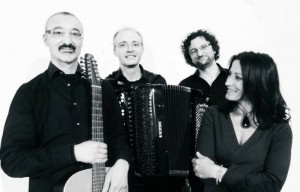 A wonderful curricula that of M° Mirko Ferrarini, Teacher of Accordion Class at the Instituto Superiore di Studi Musicali “Peri-Merulo” in Reggio Emilia and Castelnuovo ne ‘Monti. “Forged” in his artistic training from the Maestro Paolo Gandolfi, Ivano Battiston and Erminio Firmo I attended, moreover, master classes and seminars with Hugo Noth, Stefan Hussong, Joseph Macerollo, Patrizia Angeloni, Salvatore Sciarrino, Gerard Grisey. The achieved skills and applied methodologies make of Ferrarini one of the most representative figures of the new course, and certainly one of the most prepared teachers among Italians. His studies for accordion (Six cadeau) have been reported to the International Composition Competition in Castelfidardo and has published transcriptions and original works for Curci, IDMusic Paris and Berben Publisher. It’s also very intense their concert activity, in fact, he is systematically engaged with various chamber ensembles, the revival of the repertoire that ranges from Baroque to contemporary music. Nor should one forget the collaborations with some of the great composers, as Galliano, Solbiati, Battistelli, Perezzani and many others, for the spread of a new musical language among the young “aspiring” musicians and contemporary composers. But let’s find out more about our character…
A wonderful curricula that of M° Mirko Ferrarini, Teacher of Accordion Class at the Instituto Superiore di Studi Musicali “Peri-Merulo” in Reggio Emilia and Castelnuovo ne ‘Monti. “Forged” in his artistic training from the Maestro Paolo Gandolfi, Ivano Battiston and Erminio Firmo I attended, moreover, master classes and seminars with Hugo Noth, Stefan Hussong, Joseph Macerollo, Patrizia Angeloni, Salvatore Sciarrino, Gerard Grisey. The achieved skills and applied methodologies make of Ferrarini one of the most representative figures of the new course, and certainly one of the most prepared teachers among Italians. His studies for accordion (Six cadeau) have been reported to the International Composition Competition in Castelfidardo and has published transcriptions and original works for Curci, IDMusic Paris and Berben Publisher. It’s also very intense their concert activity, in fact, he is systematically engaged with various chamber ensembles, the revival of the repertoire that ranges from Baroque to contemporary music. Nor should one forget the collaborations with some of the great composers, as Galliano, Solbiati, Battistelli, Perezzani and many others, for the spread of a new musical language among the young “aspiring” musicians and contemporary composers. But let’s find out more about our character…
You has collaborated with composers such as Battistelli, Solbiati Perezzani, Fanticini, Bonilauri but also with the Orchestra della Toscana, the orchestra “Città di Ferrara,” the orchestra of the “Virtuosi Italiani”, the Philharmonic “A. Toscanini” and “Icarus Ensemble”. What was your last professional satisfaction?
I have been working since the beginning of my job with composers close to me, because I always seemed natural and obvious to know and play the music of my time. It ‘s an important and highly educational experience to deal with the musicians who compose music also to understand and know which are the processes that form the basis of writing music. By the same token I have recently been able to collaborate with four young foreign composers within the international project that the Festival of Modern Music in Huddersfield has commissioned to the ensemble Icarus, with whom I work together with for years. With them, we held several meetings and workshops before in Reggio Emilia and in England and then we performed four songs, where the accordion has an important role at the Festival, which is the most important place of modern music in Northern Europe. I have to remember the experience with Giorgio Battistelli, with whom I collaborated on the work of the Miracolo in Milan at the Auditorium Parco della Musica in Rome. A musician really exciting!
In the past he has collaborated with Richard Galliano at the piano reduction of his Concerto for accordion and orchestra and has published the transcription of the Astor Piazzolla’s Concert “Aconcagua” for Curci publisher in Milan. With which motivation has you taken of these works?
I have known Richard Galliano in 2007 when we invited him to hold a master class at the Musical institute “Merulo” of Castelnuovo ne ‘Monti (RE). It was his first time as a teacher, and many students attended the course. Galliano is not only an extraordinary instrumentalist, but a great musician who knows in depth the music composition, the history of jazz and accordion. It also has an obsessive attention to the sound and insisted at the bottom of this aspect, too often overshadowed by accordionists. On that occasion I made him know my reduction of the concert of Piazzolla, and he impressed, I commissioned me the piano version of his Opale Concerto. It was a great collaboration, which was followed by other projects and a friendship was born, which I am very honoured. There are very few concerts written for accordion of which there is a reduced version for piano, hence my work. A brief will be ready the reduction of Tres tango by Piazzolla.
Today you regularly play in various chamber ensembles with strings and wind instruments, with which you offer a repertoire that ranges from Baroque to contemporary music. How do you define your style?
I always preferred to play with traditional instruments, I think it’s a comparison from which we (the accordionist) can learn a lot. Also you can face repertoires musically very rich: with the cello we can range from Frescobaldi’s music to Gubaidulina, with the string trio we can performe Corelli and Dvorak, with the voice we can play Mozart and Britten. The feedback of the musicians and also the public has always been very positive: the singers then remain very impressed by the possibilities of the accordion to sustain the sound and create resonances really special. I have several projects in mind that I think will be realized soon.
You love to let the music speak. The preview of your collection Scale and Arpeggi is a succession of staves without a single sentence. What do you think that music can communicate more than words?
As we recall the writings by Robert Schumann, Music expresses the inexpressible, what we can not say in words. Perhaps it is better to say that we, human beings, express, through the sound, a lot of what we could not say in any other way. At least for many it is easier that way. Of course this is not a clear communication, at least with regard to the “cultured”instrumental music. Certainly emotions, moods, feelings, that we send and receive when we listen to music, remind us what is our deepest being. I also think it’s the only reason why man has felt the need to create sounds, or other art forms.
You play a Borsini accordion, which is unquestionably one of the top craft industry. How has the evolution of the accordion understood as sounds contributed over the years; how have they influenced the modern timbres in the new musical languages and what will be, in his view, the new frontiers for manufacturing companies?
We are lucky to have just the best accordion factories in Italy, which can combine the artisan look with the research and the improvement of its construction of a modern company. There was definitely an exchange in the last fifty years of innovation of the instrument and musical practice. Indeed, the language of modern music requires and demands more and more reliable instruments, which must to be precise in the mechanics and for various aspects regarding the emission of sound. The composers are fascinated by so original timbre of the accordion. Above all they are especially interested in instruments for the invoice may blend well with the traditional, so having a sound at the same time full and soft, never vulgar or metallic. In order to play in the great outdoors is not necessary to have a certain sound sharp, but rather, full-bodied and well-resonant and therefore spreads harmoniously.
They are great challenges for builders, but I think about how the renowned piano factories over the years have been able to accept and resolve, listening to the musicians and investing heavily in research. I am lucky to have found the availability of a company that has been able to satisfy me, accepting my needs with high volume and for that I thank him very much.
I also want a continuing commitment by the artisan firms in the production of learning accordions: for the young we need good instruments at acceptable cost, with good reeds and good mechanics, in order to direct them straight to the best sound, trying not to spoil the beginning their ear! If there is a strong commitment in this field, even in our country, we can expand, and many more, the number of students. There is a strong desire to “make music” and often the only hitch is the initial cost of the instrument. It is certainly not easy to combine excellent quality and price, but today it seems to me a challenge not put off any longer.
Today you teach at the Music Institute Peri-Merulo in Reggio Emilia. In these years, according to you, how have the educational system and students of music changed?
In these years we have witnessed great changes in the education system of the Conservatory. My music school was among the first to adopt the pre-academic courses and this has resulted in a major overhaul of curricula. We have more freedom now in programming, but also more responsibility to create a course of study to 360 degrees. The requirements of the music world are changing fast, but at least for the training phase there is an increasing need to provide the secure foundation on which students, according to their interests and capabilities, can move under their own power. Students must be motivated and driven to learn as much as possible within a musical framework of high level. The accordion in Italy has enormous potential for growth, there are good teachers and some schools have begun profitable cooperation with foreign countries.
The musical environment is in great trouble for the difficult economic situation, but there is a great desire on the part of young people and children to make music. My institute is always engaged in the dissemination of music throughout the country and this year I was responsible for a project, which involves over 300 children. Reggio Emilia is the leader in the Italian system of youth orchestras, a very important and widespread situation.
Music is our passion!
Questo post è disponibile anche in: Italian

 English
English Italiano
Italiano 





Leave a comment
You must be logged in to post a comment.